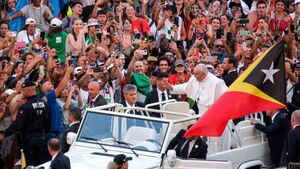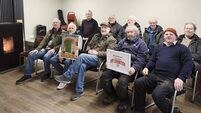Fr Paddy Byrne: Pope Francis: a voice of reason and balance

Pope Francis arrives to Parque Tejo, Lisbon for World Youth Day in August 2023
AS I WRITE this article, I'm very conscious that the health of Pope Francis seems to be seriously declining.
Pope Francis has led the Catholic Church with a deep sense of integrity and humility. A prophet who not just talks a good talk but, more importantly, walks the walk. Throughout life, his pathway has been informed by Jesus Christ.
The Gospels repeatedly highlight that Christ deliberately embraced those who found themselves on the periphery. Pope Francis is indeed shepherd to those on the periphery. He is universally recognised as perhaps the most significant world leader.
In a turbulent and often polemical world, Francis’s voice always brings a sense of reason and balance. Whatever will be regarding his current situation, I have no doubt that his pontificate historically will be significant.
Francis’s pontificate was tagged as surprising from the start. In February 2013, Benedict resigned, the first pope to step aside in nearly 600 years. Jorge Mario Bergoglio of Buenos Aires, Argentina was elected the next month: the first Jesuit pope, the first pope from the Americas and the first to take the name Francis in emulation of Francis of Assisi, the medieval Italian saint known for ‘holy poverty’.
Once the new Pope assumed office, he lived in the Vatican guesthouse rather than the Apostolic Palace.
He often rode to papal events in a Fiat instead of a Mercedes-Benz and brought an anything-goes playfulness to the regular audience outside St Peter’s.
His rapport with the public suggested that he had been changed by his election – that a man known to many Argentinians as dour and circumspect had been infused with what he calls “the joy of the Gospel”.
Since then, Francis has made the unexpected seem obvious again and again. The pope began confessing his sins before hearing the confessions of others; waded into a crowd outside St Peter’s and embraced a man whose illness had left his face marred; visited a camp for migrants and refugees on the Greek island of Lesbos (and brought some refugees back on the papal plane to settle in Italy); went to a mosque in the Central African Republic in the midst of a civil war fuelled by Christian-Muslim strife and admitted that he was wrong to have defended a Chilean bishop accused of covering up priestly sexual abuse. Though the bishop, Juan Barros, has denied these allegations, the pope accepted his resignation and averred: “I was part of the problem.”
Francis has also brought his knack for the unconventional to the everyday workings of the Vatican. He assembled a council of advisory cardinals, making it clear that he would consult with others; launched an investigation of the Vatican Bank, which was long suspected of corruption and money laundering; made efforts to streamline the Vatican administration, called the Roman Curia; and appointed a woman, Sister Nathalie Becquart from France, to a key role in the Dicastery for Bishops, one of the most influential Curial offices. These were not giant steps, but they were steps beyond those that his two predecessors had taken during their combined 34 years in office.
Pope Francis has travelled to about a dozen predominantly Muslim countries; opened the Secret Archive of documents pertaining to the Vatican’s diplomatic machinations during the World War II and spoke to the press with an offhand ease that is rare for any public figure. In July 2013, during his first press conference aboard the papal plane, he compassionately reached out to the LGBT community: “If someone is gay and is searching for the Lord and has a good will, then who am I to judge him?” – and set the tone for a pontificate whose aims he has spelled out in interviews and discussions as much as through encyclicals and other formal documents.
Pope Francis is a revolutionary. The revolution he proposes, however, is not a matter of economic or political prescription, but a revolution in the self-understanding of the Catholic Church: a re-energising return to the Pentecostal fervour and evangelical passion from which the Church was born two millennia ago and a summons to mission that accelerates the great historical transition from institutional-maintenance Catholicism to the Church of the New Evangelisation.
What happens if the Pope dies or resigns? After a short period of time, a conclave will take place. This is a most intriguing process.
In his pontificate lasting just 13 years, Pope Francis has appointed the majority of cardinals who will elect his successor, and they truly represent the universal Church.




